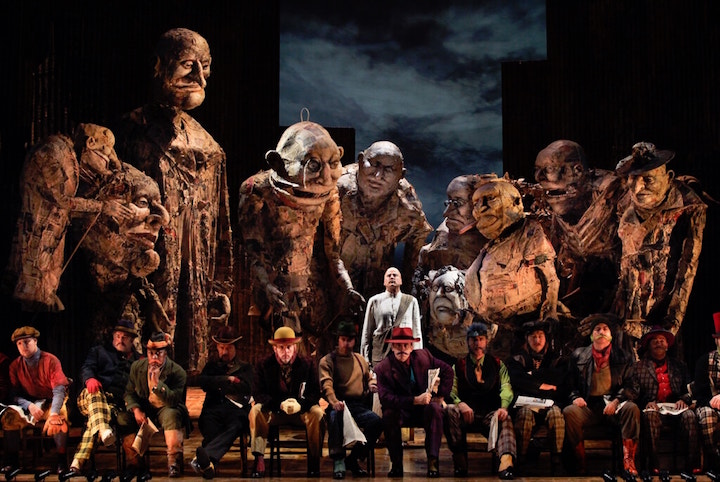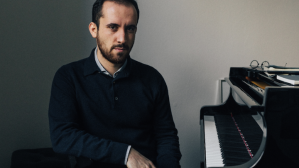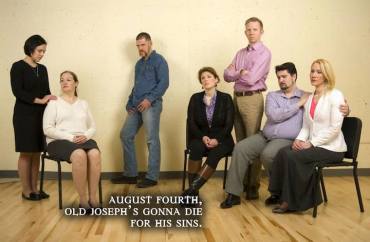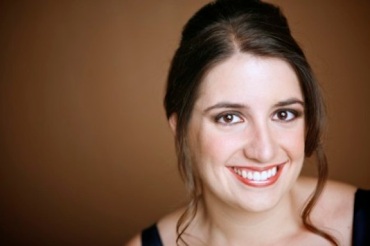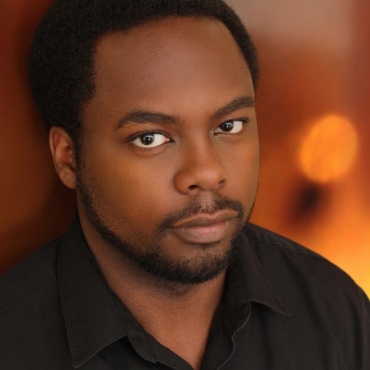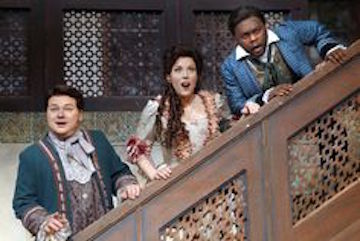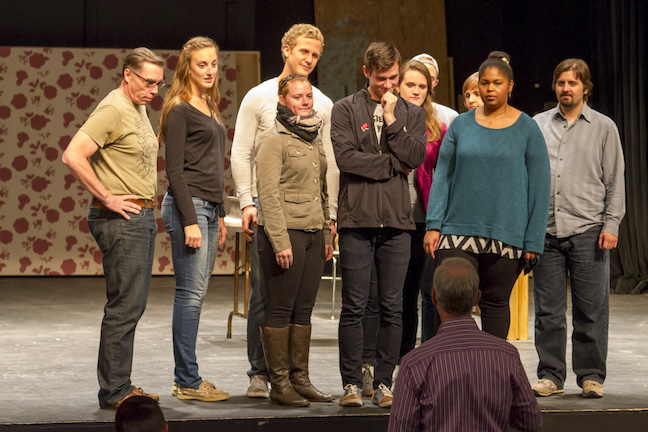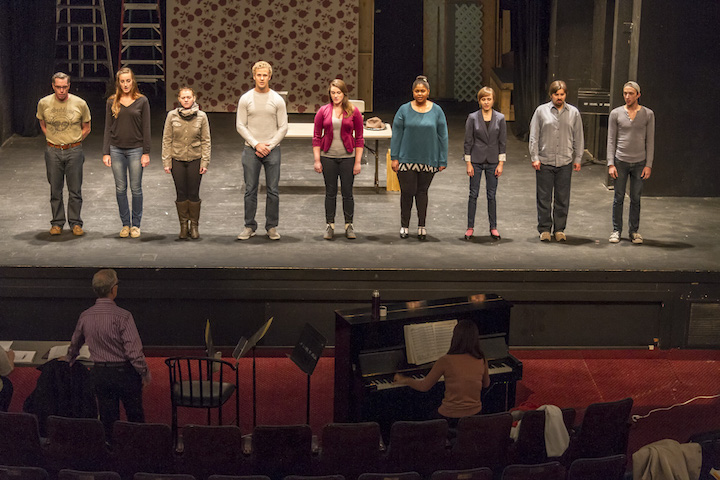The Well-Tempered Ear
Classical music: Madison Opera will stage its first-ever production of Mozart’s “The Abduction from the Seraglio” this Friday night and Sunday afternoon
Leave a Comment
By Jacob Stockinger
This weekend, the Madison Opera presents The Abduction from the Seraglio by Wolfgang Amadeus Mozart on Friday, Feb. 9, at 8 p.m. and Sunday, Feb. 11, at 2:30 p.m. in the Capitol Theater at the Overture Center for the Arts, 201 State Street.
According to a press release, the opera — below is a mock-up of the locally designed and constructed set — will be sung in German with English used for dialogue and in the translated supertitles above the stage. Running time is about 2-1/2 hours with one intermission.
 Tickets are $25-$114 with student and group discounts available. Call the Overture Box Office at (608) 258-4141 or visit www.madisonopera.org
Tickets are $25-$114 with student and group discounts available. Call the Overture Box Office at (608) 258-4141 or visit www.madisonopera.org
With some of the most virtuosic vocal writing by Mozart (below), the opera is an adventure story of love, danger, humor and humanity.
Set in the 17th-century Ottoman Empire, the opera begins when Belmonte, a Spanish nobleman, arrives at Pasha Selim’s palace to rescue three people who had been captured during a shipwreck: his fiancée, Konstanze, and their servants, Blonde and Pedrillo.
A simple escape proves no easy task, and Mozart’s masterpiece weaves together comedy, quiet reflection and youthful optimism, with a happy ending brought about by an Enlightened ruler.
“Abduction is a simply marvelous opera,” says Kathryn Smith (below, in a photo by James Gill), Madison Opera’s general director who will give free pre-performance talks in the third-floor Wisconsin Studio at 7 p.m. on Friday night and 1:30 p.m. on Sunday afternoon. “It’s the opera with which Mozart started to reinvent opera, with not only the expected arias, but also brilliant ensemble work. The very real humanity of the piece – its funny parts, its moving parts and the universal truth of the ending – is extraordinary.”
The Abduction from the Seraglio (Die Entführung aus dem Serail) was Mozart’s first major success. Written for the National Singspiel in Vienna – a pet project of Emperor Joseph II – it premiered in 1782 and was an immediate hit. (You can hear the familiar and captivating Overture in the YouTube video at the bottom.)
Like all singspiels, the opera uses spoken dialogue; indeed, the critical role of Pasha Selim is entirely spoken, perhaps one of the few instances of a major opera character not singing a note. In Madison, the dialogue will be performed in English, with the music sung in German (with projected English translations).
With a libretto by Johann Gottlieb Stephanie the Younger – an unauthorized adaptation of a libretto by Christoph Friedrich Breztner – Abduction was one the first successful German-language operas.
It was immortalized in the film Amadeus, and is famous for a possibly apocryphal story in which Emperor Joseph II criticized the work, saying to Mozart, “Too many notes,” and Mozart responded, “Exactly as many as needed.”
Abduction would go on to become Mozart’s most popular opera during his lifetime, but it has been a comparative rarity in the United States. This is Madison Opera’s first production of the opera in the company’s 57-year history.
“Mozart’s music for Abduction is a delight from start to finish,” says John DeMain (below, in a photo by Prasad), Madison Opera’s artistic director and conductor. “Great – and at times excitingly challenging – arias are enhanced by beautiful duets, trios and quartets. It has always been a favorite opera of mine, and I’m so looking forward to Madison Opera’s first production of this masterpiece with an absolutely knockout cast of great young singers.”
Mozart’s phenomenal vocal writing requires a strong team of five singers, and Madison Opera’s cast features a number of returning favorites.
Amanda Woodbury (below) sings the Spanish noblewoman Konstanze, whose aria “Martern aller Arten” is one of the most challenging arias ever written. Woodbury debuted with Madison Opera as Pamina in The Magic Flute last spring, and has recently sung leading roles for the Metropolitan Opera and Los Angeles Opera.
Tenor David Walton (below) sings Belmonte, Konstanze’s fiancé; he debuted at Opera in the Park this past summer, has sung many leading roles for Minnesota Opera, and sings at the Glimmerglass Festival this summer.
Matt Boehler (below) returns as Osmin, the palace overseer with some devilishly low bass notes. He sang Rocco in Fidelio and Leporello in Don Giovanni for Madison Opera, and more recently has sung with Minnesota Opera, Opera Philadelphia, and the Canadian Opera Company.
Konstanze and Belmonte’s servants, Blonde and Pedrillo, are sung by Ashly Neumann(below top) in her Madison Opera debut and Wisconsin native Eric Neuville (below bottom), who sang Laurie in Little Women for Madison Opera.
Alison Mortiz (below) directs this new production in her debut with Madison Opera. Moritz has directed at opera companies around the United States, including Central City Opera, Tulsa Opera and Tri-Cities Opera.
The sets and costumes (below) are locally made specifically for this production.
The scenery and lighting are designed by Anshuman Bhatia, also in his Madison Opera debut, with costumes designed by Karen Brown-Larimore. As always, the opera features the Madison Opera Chorus and the Madison Symphony Orchestra.
Madison Opera’s production of The Abduction from the Seraglio is sponsored by Kay and Martin Barrett, Fran Klos, Sally and Mike Miley, and the Wisconsin Arts Board.
Tags: "Amadeus", #LudwigVanBeethoven, #MadisonOpera, #MadisonSymphonyOrchestra, #MetropolitanOpera, #MinnesotaOpera, #OperaInThePark, #TheMet, #UnitedStates, #WolfgangAmadeusMozart, Abduction From the Seraglio, adventure, afternoon, Alison Mortiz, America, aria, Artistic director, Arts, bass, Beethoven, Canada, Canadian Opera Company, Capitol, captivating, cast, character, choral music, chorus, cinema, Classical music, comedy, conductor, construct, danger, debut, design, Devil, dialogue, director, Don Giovanni, duet, Emperor, empire, ending, English, enlightenend, Enlightenment, ensemble, escape, familiar, festival, fiancee, Fidelio, film, Friday, funny, General director, German, Glimmerglass, group, happy', humanity, Humor, intermission, Jacob Stockinger, John DeMain, Kathryn Smith, language, libretto, lighting, Little Women, local, Los Angeles, Los Angeles Opera, Love, low, Madison, Madison Opera, Madison Symphony Orchestra, masterpiece, Metropolitan Opera, Minnesota Opera, movie, Mozart, Music, native, New York City, night, nobleman, noblewoman, notes, opera, Opera Philadelphia, optimism, Orchestra, Ottoman, Ottoman Empire, Overture, Overture Center, People, popular, premiere, press, press release, production, Quartet, quiet, rarity, reflection, rescue, ruler, running time, scenery, servant, set, sets, shipwreck, singer, singspiel, Spanish, spoken, stage, story, Student, success, Sunday, supertitle, surtitle, team, The Magic Flute, the Met, theater, ticket, translation, trio, truth, United States, universal, University of Wisconsin-Madison School of Music, University of Wisconsin–Madison, Vienna, virtuoso, vocal music, Wisconsin, Wisconsin Arts Board, Wolfgang Amadeus Mozart, work, writing, young, youthful, YouTube
Classical music Q&A: Meet opera director David Ronis who makes his local debut in the University Opera’s production of Benjamin Britten’s “Albert Herring” this Friday night in Music Hall with additional performances on Sunday afternoon and Tuesday night.
4 Comments
By Jacob Stockinger
You may recall that the longtime director of University Opera William Farlow retired last spring. While no permanent successor has been named yet, the impressively qualified David Ronis, from the Aaron Copland School of Music at Queens College, City University of New York (CUNY), was chosen from a national search and is serving as a guest director this academic year.
Ronis (below, seen talking to the cast on stage) makes his University of Wisconsin-Madison debut this Friday night at 7:30 p.m. in Music Hall, at the foot of Bascom Hill, with a production of British composer Benjamin Britten’s comic opera “Albert Herring.” (The opening scene from a Los Angeles Opera production can be heard at the bottom in a YouTube video.) Additional performances are on Sunday afternoon at 3 p.m. and Tuesday night at 7:30 p.m.
Tickets are $22 general admission; $18 for senior; and $10 for student. They are available at the door and from the Wisconsin Union Theater Box Office or call (608) 265-ARTS (2787)/ Buy in person and you will save the service fees.
Here are links with more information about the opera and about Ronis, including a fine profile interview done by Kathy Esposito, the public relations and concert manager at the UW-Madison School of Music:
http://www.music.wisc.edu/2014/09/19/david-ronis-theatrical-emphasis/
http://www.music.wisc.edu/faculty/david-ronis/
http://www.music.wisc.edu/2014/09/19/university-opera-presents-brittens-albert-herring/
And here is a link to David Ronis’ personal website:
Finally, here is the email Q&A that David Ronis (below, in a photo by Luke Delalio) gave to The Ear:
Can you give readers a brief introduction to yourself, including when and how you started learning music, your early training and formative experiences, your major professional accomplishments and some personal information like hobbies and other interests as well as current and future plans for your career?
I grew up on Long Island, did my undergraduate degree (a B.F.A. in Voice) at Purchase College, and have lived in Manhattan ever since. I studied both piano and voice as a kid and, in high school, was very much involved in musical theater. After graduating from Purchase, I supported myself by doing a lot of professional choral singing.
Soon after, I started getting hired to sing character tenor roles in opera companies in U.S, Europe and Asia, which I did for a number of years. One of the highlights was being a part of Leonard Bernstein’s A Quiet Place/Trouble in Tahiti when it was done at La Scala Milan, the Kennedy Center and the Vienna State Opera.
At one point in the mid-’90s, when I had less than a full year of regional opera work, I started auditioning for Equity musical theater jobs and was cast in the Los Angeles company of Disney’s Beauty and the Beast.
In opera circles, I was considered to be a “good actor.” But, to forgive myself (and others), I didn’t really know from good acting! In LA, my new colleagues and friends were actors, as opposed to singers and musicians, and I started seriously questioning my own (lack of) acting technique. After three years of doing Beauty –- in both LA and on the national tour -– I went back to New York, got into in a heavy-duty acting class, and started working in spoken theater, TV commercials (I have some very funny stories about that), and independent films, as well as continuing to sing in opera regionally.
My work in theater completely changed my perspective on stage work in opera and I found myself newly critical of much of the operatic acting I saw.
One day, my friend Paul Rowe (below) –- who teaches voice at the UW-Madison — was in New York hanging out at my apartment (this is very vivid in my mind) and he said something like, “David, you should put this together. You’re now an accomplished actor as well as a singer and you have a pretty unique perspective on how one affects the other.” Bingo!
Long story short: I started teaching Acting for Singers classes, doing small directing projects, and very soon got hired at Queens College to direct the Opera Studio. Almost immediately, this transition from performing to teaching just felt right.
I was hired as an Adjunct Lecturer at Queens with only a bachelor’s degree, and decided that I should probably have at least a master’s. So I enrolled in a terrific M.A. L.S. (Master of Arts in Liberal Studies) program at a de-centralized SUNY school, Empire State College. The M.A.L.S. was probably one of the most difficult things I’ve ever done. It is a self-designed, inter-disciplinary research degree in which the candidates have to articulate their areas of academic inquiry and pursue them by creating individual courses and working with tutors. Over 2 ½ years, I wrote about 300 pages of material focused on operatic acting and production, research that I still regularly call upon in my teaching.
What are my principal influences? I’d say that my principal acting teacher, Caymichael Patten, is a big one. Cay’s a terrific, tough teacher who tells it like she sees it. She has an uncanny knack for “being inside your head –with you.” I learned a huge amount from her and, in many ways, have modeled my teaching on Cay’s. I also have a number of friends – all opera directors working in academia as well as professionally, who are on the same page as I am as far as operatic acting training. They’ve been big influences too -– Stephen Wadsworth (below, who teaches at the Juilliard School) and Robin Guarino, to name just a couple.
As for the future, who knows? I’ve actually never been one to have a detailed life plan. I’ve been very fortunate that opportunities have come my way and I’ve just followed my nose. I do know one thing -– that my passion for directing and teaching seems to be growing (if that’s even possible) and that I very much enjoy working in a university environment.
As an East Coast native, how do you like the Midwest, Madison and the especially the UW-Madison?
I’ve spent plenty of time in the Midwest, mostly working. So I “get” the Midwest and I’m comfortable here. I’m finding what “they say” about Madison to be true -– that it’s a pretty unique place within the Midwest — culturally, politically, intellectually.
I think these are things that make people who are kind of East Coast-centric, like myself, feel more at home, when “home” means lots of intellectual and artistic stimulation. What’s not to like about a city where everyone reads the New York Times and The New Yorker magazine and goes to the Madison Symphony Orchestra!
Why did you choose “Albert Herring” by Benjamin Britten (below top) to do this semester and “The Magic Flute” by Mozart (below bottom) to do second semester? Have you staged them before? What would you like audience members here to know about your productions of them?
I make repertoire decisions based on a variety of factors. This year, we needed to do a piece with small orchestral forces in the fall and a full orchestra show in the spring.
I also like to do shows that involve a good number of students. Both the Britten and the Mozart fit those descriptions.
Also, the “who do we have at school” factor is big. We need to do operas that we can cast well from the student population.
And, most importantly, I consider the educational value of various shows. Albert Herring is not only a great piece of music and theater, but there’s so much that the students learn from working on it. The roles are difficult, both vocally and musically. And since it’s a big ensemble show, students are challenged to develop their ensemble singing and acting skills. So far, I’m very pleased with the results.
I’ve directed The Magic Flute before. We’re going to do a version of a production I did some years ago that locates the drama vaguely in a South Asian environment. Flute, for all of its brilliance, is kind of a dramaturgical mess. Who are the truly good and bad guys/gals? Where do we start and where do we end up and what do each of the characters learn for having gone on the journey?
My take on the story very indirectly alludes to a conflict between East (Sarastro) and West (Queen of the Night), and attempts to examine the two opposing forces on the most basic, human level – even if they are iconic figures. Why makes the Queen tick? Why did Sarastro “steal” her daughter and why is he “holding her captive?” These are the questions that intrigue me.
Was there an Aha! Moment – a work or performer, a concert or recording – that made you realize that you wanted to have a professional life in music and specifically in opera?
My Aha! moment? OK, you’re going to think I’m a nerd. As a high school senior, I took a philosophy elective in which I was reading people like Schopenhauer and Nietzsche. At the time, I was obsessed with an LP called “The Genius of Puccini” -– essentially excerpts from operas by Puccini (below) –- which I would play over and over again in my room. I recall going into my parents’ room one night, with record blaring in the background, and ranting on about what I was reading and how it described exactly what filled me up like nothing else. (Cue the big ensemble from the first act of Turandot). From that moment, it was all downhill!
Is there anything else you would like to add or say?
I’d just like to encourage people to come to both University Opera productions. We’ve got a terrific cast for Albert Herring, not to mention an incredibly talented and articulate young conductor in Kyle Knox (below)– Kyle is truly someone to keep your eye on.
We’ve been having so much fun during rehearsals – laughing a lot! I firmly believe that spirit transfers across the proverbial footlights.
If any of your readers are hesitant (perhaps because they tend to respond to 19th century Romantic pieces and might be reticent to go to an opera with which they’re not familiar), I can confidently say that Albert Herring is a very accessible piece –– extremely entertaining and, at times, quite moving. The physical production is coming along –- all in all, I’m very excited about the show.
Tags: Aaron Copland School of Music, acting, Albert Herring, Arts, Beauty and the Beast, Benjamin Britten, City University of New York, Classical music, Conducting, David Ronis, director, drama, Empire State College, Friedrich Nietzsche, Jacob Stockinger, Juilliard School, Leonard Bernstein, Los Angeles, Los Angeles Opera, Madison, Madison Symphony Orchestra, Mozart, New York City, opera, Orchestra, Puccini, Schopenhauer, Singing, stage director, Turandot, University of Wisconsin-Madison School of Music, University of Wisconsin–Madison, Vienna State Opera, vocal music, Walt Disney, Wolfgang Amadeus Mozart, YouTube

